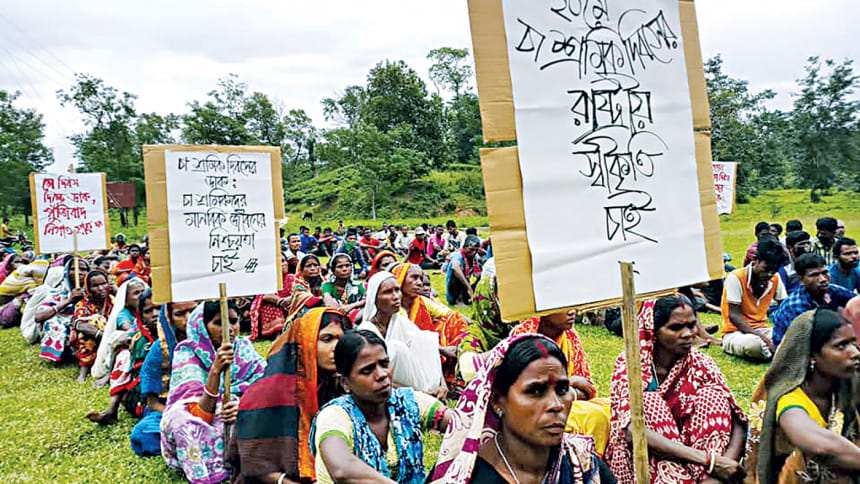Tea Workers’ Day: 100 years of a forgotten tragedy

These days, Shamnarayan Goor doesn't do much other than sitting on the porch of his hut and watching the day go by, over the hilly terrain of Lungla Tea Garden in Sylhet.
Other than his family members, the 90-year-old retired tea worker of Moulvibazar's Kulaura upazila does not see that many visitors or engage in conversations with others.
However, every year for the last many years, on May 20, he makes an effort to let people -- especially the youth -- know the history of their people, their struggle and how on this day in 1921 their ancestors, in a desperate attempt, initiated a protest march.
This newspaper met with Shamnarayan on a Saturday afternoon.
As we sat beside him on small stools, and heard him speak in intervals and with difficulty switching between languages, we could tell age has taken its toll on him. But it could not diminish his will to carry on.
These days, Shamnarayan said, very few people remember the 1921 march, when around 30,000 tea workers left their workplaces, protesting against the inhumane working conditions and torture at the hands of British owners.
"Mulluke Cholo" -- the call to go back home -- reverberated through the hilly terrains of Sylhet, as they started walking towards Meghna ghat in Chandpur on the morning of May 20 in 1921, he added.
"My father was one of them."
"They did not know what lay ahead, but they knew it could not be worse than what they were leaving behind. That's why, to them, it was not only a protest march but also a desperate attempt to journey back home to the lands of their origin -- Bihar, Odisha and Assam," said Shamnarayan.
The march, however, did not go as planned for those workers, brought to this part of the Bengal with a promise of a better life, which remained a far cry.
When they reached Meghna ghat, the then Assamese police opened fire on the protesters. Many of the workers were killed, and their bodies were thrown into the river.
The rest fled, while some eventually got caught and were subjected to torture.
"My father was among the ones who escaped and eventually re-joined work at the gardens, as they had nowhere else to go," said Shamnarayan.
Today marks the 100th year of that march to home that led to the massacre of tea workers.
A century has gone by but their plight has not changed much. Today, they can barely live by the wage they earn, and their families cram into small quarters.
Furthermore, these indigenous workers -- paid Tk 120 a day along with other benefits such as housing, ration and treatment -- and their family members are on the verge of losing their language and cultural identity.
According to the statistical handbook on Bangladesh tea industry, published in June last year, there are 166 tea gardens in the country with a total of 1,40,164 registered and casual workers.
The government has yet to recognise "Tea Workers Day" at the national level and take effective steps to preserve different spoken languages as well as distinct cultural practices of different communities spread out in the tea gardens of Sylhet division, according to Bangladesh Tea Workers' Union.
The use of their mother tongues is also diminishing day by day, as Bhojpuri or Bangla are the two most commonly used languages among all communities in the region, said Sujit Baraik, a resident of Khan tea garden.
Besides, local schools do not have any curriculum in their mother tongues.
"Our children lost interest in learning their mother tongue Sadri, because Bangla is the common language of everyone outside their homes," said Baraik, also vice president of Sylhet Cha Jonogosthi Chhatra O Jubo Kalyan Parishad.
"They know many words but cannot use them properly," he added.
Moulvibazar's Rajghat union chairman Bijoy Banarjee echoed him.
According to the International Mother Language Institute, Bangladesh now has 40 small ethnic groups with their own languages. Researchers have identified 14 of these languages as endangered. Among those, quite a few are spoken by workers at the tea gardens, he added.
Mesbah Kamal, professor of history department at Dhaka University, earlier said the indigenous tea workers living in poverty are losing their culture and heritage.
Their cultural identity is now under threat due to socio-economic circumstances, he added.
Raju Nunia, a student of microbiology at Jahangirnagar University, said even though education is a human right, tea workers and their children, who play an important role in the country's economy, are mostly deprived of that right.
Nunia, also general secretary of University Tea Students' Association, said due to extreme poverty, children of the tea workers somehow reach the primary level, but majority of them drop out due to financial constraints.
Gita Rani Kanu, president of the Bangladesh Tea Workers Women's Forum, said women workers of the tea gardens are deprived of education, health and equality.
"The authorities concerned need to pay attention to female tea workers so that their healthcare, education and work environment can improve. Also, harassment and discrimination against them must stop," she added.
Prof AFM Zakaria of anthropology department at Shahjalal University of Science and Technology said, "Theirs [tea workers] is a history of identity loss, deprivation, marginalisation and non-recognition. The government will have to come forward and protect the small indigenous communities and their culture."
Rambhajan Kairi, general secretary of Bangladesh Tea Workers' Union, said, "We have been making demands for a long time to ensure basic rights of tea workers, wage increment, land rights, housing and medical treatment so that they too can live a dignified life."
Asked about recognition of the day at national level, GM Shiblee, chairman (Sylhet branch) of Bangladesh Tea Association, told The Daily Star yesterday that any demand of this sort has to officially come from the workers' union.
During the visit to tea gardens at Moulvibazar, this newspaper also spoke to many workers. They said it has been 100 years since Shamnarayan's father and many others marched for a better life, but no significant steps were taken to recognise "Tea Workers Day" or improve their conditions.
By the time we finished talking to Shamnarayan, the evening had already spread out against the sky.
As we bade him farewell, he smiled at us. There was still hope in that smile -- hope of a better life and a better future -- not for him but for the thousands toiling away for years at the tea gardens.
A HISTORY OF SRTUGGLE
According to Bangladesh Tea Board, the first tea production started in the subcontinent in Sylhet around 1849.
Historians said the East India Company first started tea cultivation in Sylhet's Malinichhara tea garden on an experimental basis.
The British companies brought the workers from Bihar, Madras, Orissa, Andhra Pradesh, Madhya Pradesh, West Bengal, Uttar Pradesh and other places in India to work in the tea gardens.
The misfortune of these indentured labourers started with their journey to the tea gardens. According to an account, in the early years, many tea plantation workers died during their long journey to the tea gardens and due to the tough work and living condition.
Upon arrival, their luck did not change much. They had to clear jungles, plant and tend to tea seedlings and saplings, plant shade trees, and build bungalows for tea planters, according to Philip Gain, researcher and director of Society for Environment and Human Development.
But they had their destiny tied to their huts in the "labour lines" that they built themselves.
In protest of their continued persecution, the then tea workers' leaders called for the "return to motherland" movement.
Marking the incident, Tea Workers Day will be observed today like every year with due solemnity.


 For all latest news, follow The Daily Star's Google News channel.
For all latest news, follow The Daily Star's Google News channel. 



Comments